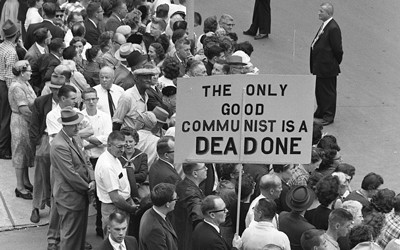The late 1950s were a hot time in the Cold War. The U.S. had the bomb, the Soviets had the bomb. Twenty-four seven, planes patrolled waiting only for the command to drop nuclear payloads. The iron curtain had shuttered most of Eastern Europe, and China further complicated the scene by becoming Communist in 1949. The whole world feared the two biggest kids on the block would inevitably duke it out.
After learning that Soviet Premier Nikita Khrushchev said he was “curious to have a look at America,” President Eisenhower invited him to visit in the fall of 1959. This goodwill gesture was intended to improve relations and also to garner Eisenhower a reciprocal invite to the U.S.S.R.
Nikita Khrushchev was, for my money, the most interesting of all the Soviet leaders. He had animated, boisterous, and emotionally driven tendencies. From the 1956, “We will bury you,” quote referring to the United States to his infamous shoe incident at the United Nations, which there are various eyewitness reports that while he did take it off and place it on the podium, it is questionable if he actually banged it.
Part of his banter was no doubt driven by an inferiority complex, both personal and for the Soviet Union. Born the son of a common laborer he spent his formative years in a peasant village described as practically medieval. After primary school, his education consisted of state run training opportunities and publications. Likewise, the Soviet Union was perceived as backwards and technologically inferior to the West.
The invitation and the attitude of respect he received from the premier world leader endeared Eisenhower to Khrushchev. Eisenhower had led the great crusade to defeat Hitler suggesting that for Khrushchev this invite from “Ike” was similar to being asked to join the cool fraternity. Khrushchev later noted in his memoirs, “I still remember how delighted I was the first time Eisenhower called me, “my friend.”
President Eisenhower incurred significant political risk with the visit. The general opinion in America toward Premier Khrushchev’s impending visit was less than favorable with the animosity aimed not only at Khrushchev but also at Eisenhower. Many citizens were concerned our enemy was getting a free inspection of America. However, unbeknownst to the American public, Eisenhower had been getting a free look into the Soviet Union since 1956 with U2 spy planes. He staunchly believed that Khrushchev’s visit would only improve relations.
The American tour included stops in Washington, D.C., New York, California, Iowa, and Pennsylvania. Khrushchev enjoyed his first hotdog at a meat packing plant in Iowa, saw the Empire State building, but was unimpressed, “If you have seen one skyscraper, you have seen them all,” and he attended a star-studded Hollywood luncheon with such celebrities as Gary Cooper, Frank Sinatra, Elizabeth Taylor, and Marilyn Monroe.
The trip concluded at Eisenhower’s Gettysburg farm where he was introduced to the President’s grandchildren. The Soviet Premier engaged the children and told them their names in Russian. At the end of the visit, he gave them little red star pins. However, the pins were soon confiscated, “My mother wanted those red pins,” Susan Eisenhower said. “She certainly didn’t want us to wear them anywhere.”
To place this in perspective, handing Eisenhower’s grandchildren a red star in 1956, the era of better dead than red, would be the equivalent of a modern day German leader passing out swastika pins to a President’s family.
For all the positives generated by Khrushchev’s trip to the U.S., there was one glaring omission– he was forbidden to visit Disneyland.
The theme park was included in the original itinerary, however, Los Angeles Police Chief William Parker feared Khrushchev’s safety could not be guaranteed. Thoroughly disappointed, and never one to pout quietly, Khrushchev ended his comments at the Hollywood luncheon with a tirade that included shaking his fist, “Do you have rocket launching pads there (Disneyland)? …What is it? Is there an epidemic of cholera or plague there? Or have gangsters taken hold of the place that can destroy me? And I say I would very much like to go and see Disneyland. For me such a situation is inconceivable."
We all know the magic of a Disney park. It has the power to turn us into kids again, and of course its best trick is how easily it separates us from loads of cash. Perhaps it could have separated Khrushchev from the monumental worries of being the Soviet Premier-the cherry on top of the goodwill ice cream Sunday, compliments of Eisenhower.
Picture Khrushchev flying with Dumbo, getting dizzy on the tea cups, experiencing the thrill of the Jungle Cruise and hugging Mickey Mouse. For a man with a penchant for impulsive and immature behavior, would it have made a difference in the tumultuous years that followed? Years that included the crash of a U2 spy plane on Russian soil, the Bay of Pigs, and the Cuban Missile Crises. Perhaps not…but we will never know.
Just imagine, it is the wee hours of the morning and Khrushchev’s plane is far out over the Atlantic. Everyone is asleep, the only noise is the hypnotic drone of the Tupolev 114’s engines. Nikita is curled up in a window seat, with Mickey Mouse ears on his head. As he drifts off to sleep he mumbles, “В конце концов, это маленький мир, это маленький, маленький мир.” Which translates to, “It’s a small world after all, it’s a small, small world.”
To learn more about Eisenhower and Khrushchev:
https://newsinteractive.post-gazette.com/usparks/a-presidents-retreat/
https://www.history.com/this-day-in-history/eisenhower-and-khrushchev-meet-for-talks
https://www.nytimes.com/2003/07/26/opinion/did-he-bang-it-nikita-khrushchev-and-the-shoe.html
http://www.flinders.edu.au/sabs/fjhp-files/2008/ViorelaPapuc2008.pdf
Nikita Khrushchev, Memoirs of Nikita Khrushchev, ed. Sergei Khrushchev, trans. George Shriver
William Taubman, Khrushchev: The Man and His Era
Public Papers of President, Dwight D. Eisenhower 1960


